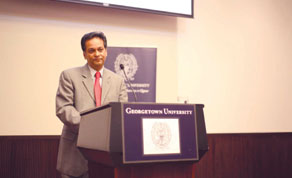 |
| Ananthakrishnan Prasad giving one of Georgetown’s Distinguished Lectures series this week |
Prasad gave a presentation on Qatar’s economy, the ingredients that made it one of the fastest growing Middle Eastern economies of the decade, and the challenges it faces in his lecture entitled ‘Qatar: Economic Performance, Outlook and Challenges.’
“Qatar has the third largest reserves of natural gas in the world; foreign assets (central bank and sovereign wealth fund) stand at an estimated $150bn; 85.9% of government employees are Qataris; and, although over 99% of private sector employees are non-Qataris, unemployment is as low as at 0.5%,” he noted.
“Together with distribution of wealth among a small national population, this goes a long way to explaining why Qatar is stable and has remained relatively insulated from problems in the global economy and the Arab world,” he added.
“The hydrocarbon-reliant country has hedged itself against price falls or recessions. Even if demand for LNG dips in one country, Qatar can divert its supplies to someone else,” he explained.
Real annual GDP growth has averaged over 18% since 2006 (compared to 9% for the GCC as a whole), according to Prasad, who argued that the country’s “stellar” economic performance has been spurred by high hydrocarbon prices, but this also led to rising fiscal dependency on hydrocarbons as well as an increase in appetite for capital and current expenditures.
But while Qatar’s outlook is positive, there are increasing risks, Prasad pointed out: “There remain risks of global tightening of liquidity, a slowdown of the global economy, and rising break-even oil prices.”
He noted that 2012 is expected to be the last year for Qatar to witness another strong cycle of real GDP growth, thereafter stabilising, as the country’s moratorium on new projects come into effect. Prasad forecast some inflationary pressure beyond 2012, leading to core inflation figures around the 5% mark in the medium term.
The challenge for Qatar, he argued, was to design a long-term fiscal framework in the absence of an independent monetary framework. “Qatar should have a formal framework of fiscal policy rooted in formal rules, currently, you have informal rules where budgets are based on assumptions,” he said.
Georgetown’s Dean Professor Gerd Nonneman, said: “I am both proud and grateful that Dr. Prasad was willing to come and give a Distinguished Lecture at Georgetown on Qatar’s economy and prospects, especially in the midst of his team’s already very full schedule.
“At Georgetown, we have of course a team of economists as well as economics students, but we’re all part of the country’s development, so we feel we all have a stake.
“It was good to see so many in the audience from outside Education City, from the Central Bank and commercial banks, to Silatech and several government and private organisations and companies,” he added.

